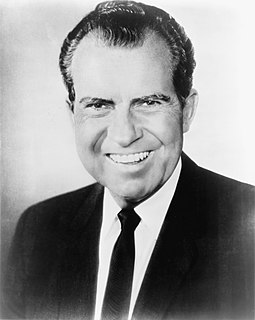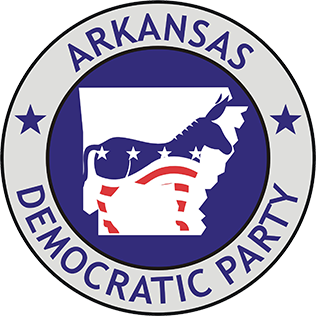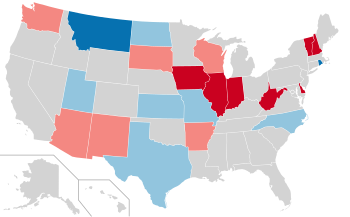
The 1968 United States presidential election was the 46th quadrennial presidential election, held on Tuesday, November 5, 1968. The Republican nominee, former vice president Richard Nixon, defeated the Democratic nominee, incumbent vice president Hubert Humphrey, and the American Independent Party nominee, former Alabama Governor George Wallace.

Arch Alfred Moore Jr. was an American lawyer and Republican politician from West Virginia. He began his political career as a state legislator in 1952. He was elected the 28th and 30th governor of West Virginia, serving from 1969 until 1977 and again from 1985 until 1989, he is the longest-serving West Virginia Governor in state history with 12 years of service. He is the father of U.S. Senator Shelley Moore Capito.

Warren Eastman Hearnes was an American politician who served as the 46th governor of Missouri from 1965 to 1973. A member of the Democratic Party, he was the first officeholder eligible to serve two consecutive four-year terms.

The Alaska State Senate is the upper house in the Alaska Legislature, the state legislature of the U.S. state of Alaska. It convenes in the Alaska State Capitol in Juneau, Alaska and is responsible for making laws and confirming or rejecting gubernatorial appointments to the state cabinet, commissions and boards.

The 1968 United States Senate elections were elections for the United States Senate which coincided with the presidential election of the same year. Although Richard Nixon won the presidential election narrowly, the Republicans picked up five net seats in the Senate. Republicans would gain another seat after the election when Alaska Republican Ted Stevens was appointed to replace Democrat Bob Bartlett.

Robert David Fulton is an American politician who briefly served as the 37th governor of Iowa during the first 16 days of 1969. He also served as the Lieutenant Governor of Iowa from 1965 to 1969.

The Democratic Party of Arkansas is the affiliate of the Democratic Party in the state of Arkansas. The current party chair is Grant Tennille.
The Iowa Democratic Party (IDP) is the affiliate of the Democratic Party in the U.S. state of Iowa.
In the United States, a governor serves as the chief executive and commander-in-chief in each of the fifty states and in the five permanently inhabited territories, functioning as head of government therein. As such, governors are responsible for implementing state laws and overseeing the operation of the state executive branch. As state leaders, governors advance and pursue new and revised policies and programs using a variety of tools, among them executive orders, executive budgets, and legislative proposals and vetoes. Governors carry out their management and leadership responsibilities and objectives with the support and assistance of department and agency heads, many of whom they are empowered to appoint. A majority of governors have the authority to appoint state court judges as well, in most cases from a list of names submitted by a nominations committee.

The 2010 Iowa gubernatorial election was held on Tuesday, November 2, 2010 to elect the governor and lieutenant governor, to serve a four-year term beginning on January 14, 2011. In Iowa, the governor and lieutenant governor are elected on the same ballot.

Some type of election in Connecticut occurs annually in each of the state's cities and towns, the exact type of which is dependent on the year. Elections for federal and statewide offices occur in even-numbered years, while municipal elections occur in odd-numbered ones. The office of the Connecticut Secretary of State oversees the election process, including voting and vote counting.

The 1964 United States Elections were held on November 3, and elected the members of the 89th United States Congress, as well as the 45th Presidential Election. The Democratic party retained the presidency and added to their majorities in both chambers of Congress. This was the first presidential election after the ratification of the 23rd Amendment, which granted electoral votes to Washington, D.C.

United States gubernatorial elections were held 7 November 1972 in 18 states and two territories, concurrent with the House, Senate elections and presidential election.

United States gubernatorial elections were held on 3 November 1970, in 35 states and two territories.
Marion Harland Crank was an American Democratic politician from Foreman in Little River County in the U.S. state of Arkansas. He served in the Arkansas House of Representatives from 1951 to 1968. He was the Speaker of the Arkansas House of Representatives from 1963 to 1964 and his party's gubernatorial nominee in 1968, but he was narrowly defeated by the incumbent Republican Winthrop Rockefeller.

United States gubernatorial elections were held on November 8, 1966, in 35 states. 12 Democrats and 23 Republicans won election, bringing the partisan reflection of the nation's states to 25 Democrats and 25 Republicans. This election coincided with the Senate and the House elections.

Elections were held in Illinois on Tuesday, November 5, 1968.

United States gubernatorial elections will be held on November 5, 2024, in 11 states and two territories. The previous gubernatorial elections for this group of states took place in 2020, except in New Hampshire and Vermont where governors only serve two-year terms and will elect their governors in 2022.















